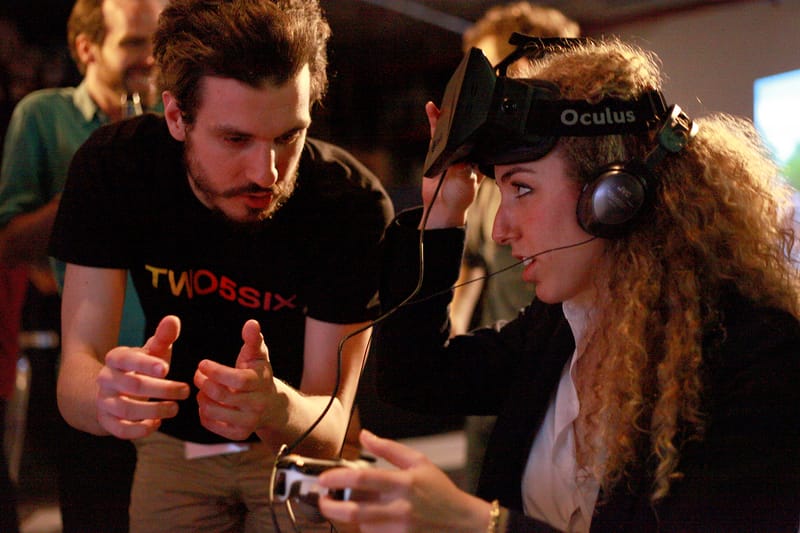This article is part of a series called Shut Up, Videogames, in which critic Ed Smith invites games old and new to pipe down, or otherwise. In this edition, he looks at Swery’s bizarre murder mystery game D4: Dark Dreams Don’t Die.
///
I’m not sure how but I can always tell when eccentricity is being affected. There’s a massive difference between Shadow of the Damned and Killer7—they both come from Goichi Suda, but in the former he’s putting it on, while in the latter, he genuinely has a bizarre, frantic vision. If you’ve played them you’ll know what I mean. Shadows of the Damned tries too hard. Killer7 lets its abstractness and absurdity float by, without cloying for the audience’s recognition.
Genuine eccentricity of that kind is a hard thing to come by in videogames. Saints Row, Goat Simulator, Catherine—dozens of the ostensible “crazy” videogames feel less like the work of a truly spirited game-maker, or group of game-makers, and more like products, designed and cultivated to be as out-there as possible. They’re pretentious, fake and possessing not a genuine personality but one that’s constructed—they’re anti-eccentricity.

I enjoyed Deadly Premonition, but since it so completely ripped off Twin Peaks, it’d feel wrong to call it a great work of imagination. A lot of that game’s eccentricities belong not to Swery, its creative director, but David Lynch. Swery’s follow-up D4 is still influenced by Lynch, as well as The Twilight Zone and (worryingly) Hideo Kojima, but it feels much more original.
That’s an overused buzzword in game criticism, taken to mean good, not repetitive, worth your money—but to D4 it truly applies. Though it pays homage to a lot of other absurdist and surreal work from both cinema and videogames, it’s one of the few titles this year to surprise me, to make me excited and curious about what it’d do next. My favourite moments are the reveal and subsequent appearances of Roland Walken, a gigantic, slow-talking man with a surgical mask and a knife and fork, whose glare follows you wherever you walk. Despite his enormous size, he’s able to contort into the tiniest spaces, unfurling himself every now and then to pose questions about the murder you’re investigating.
one of the few titles this year to surprise me
Videogame designers typically seem to associate scary, strange or eccentric characters with wacky weapons, absurd suits of armour and loud personalities—I always think of the boss characters in Metal Gear Solid, the supporting cast of Final Fantasy, the NPCs in Dark Souls. Roland Walken, by contrast, is just subtly off. I don’t want to keep comparing Swery to Lynch, because I think with D4 he’s started to break away, but Walken makes me think of Mulholland Drive‘s cowboy or Blue Velvet‘s Ben, characters who, if you walked by them in the street, might not draw the eye, but in close proximity are absolutely bizarre. For all the colour and abstraction in D4, Swery manages small, quiet weirdnesses—he’s able to resist the temptation to go big.
He’s also interested in plot. Goat Simulator and Saints Row either dispense or lampoon the idea of a story—aside from when it comes to stringing together their wackiest moments, they aren’t interested in narrative. D4 is actually coherent and well-written. Swery and Access Games manage to interlace vibrant imagery and exuberance with a complex but not convoluted murder mystery, the first missing-wife plot to be interesting since Silent Hill 2, and I think that’s what helps D4‘s eccentricity to never feel like masturbation, or affectation. I’m all for expression for expression’s sake, but in a lot of games wackiness and absurdity feel purposeless to the point of heartless. Saints Row isn’t madcap in a way that denotes aesthetic freedom or raw outpouring of emotion. It just seems like the creators couldn’t be bothered. It’s empty extravagance, ostentatious and conspicuous, and suggesting not liberation but lack of taste, a determination to be seen as crazy and out-there as opposed to genuine surrealist conviction. Swery and Access tie all of D4‘s eccentricities to plot and character. They pick two small spaces—an apartment and the economy coach of a jet liner—and pour everything into bringing them to life. There’s something confident, and I think genuine, about game-makers able to find the vibrancy in those everyday confines. It’s not without flaw—the protagonist is a bit flat, and I’m holding out judgment on the woman who dresses like a cat—and I worry that Swery might be one of those game-makers whose idiosyncrasies and good humour can fool critics into ignoring, or at least making excuses for, the way he treats women. As a teenager I was duped by Metal Gear Solid. As an adult, I remain only cautiously optimistic about D4.






